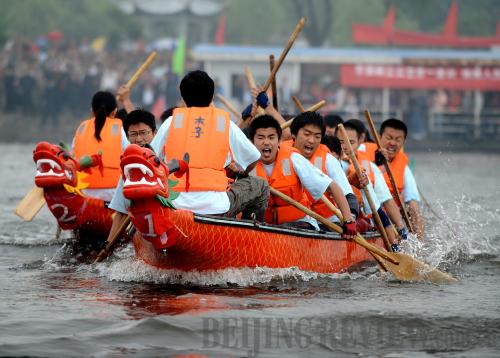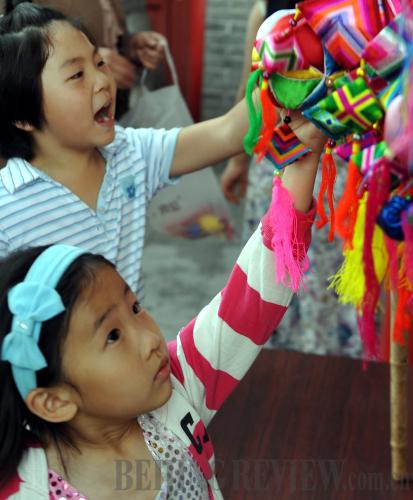|
 |
|
BUSY SUMMER: farmers harvest and sow during the two-week period following mang zhong (YANG YINPENG) |
Solar Term 9: Grain in Ear (Mang Zhong)
Gregorian date: June 5 or 6
Lunar date: Early in the 5th month
In Chinese, bristly crops and seeds are referred to as mang and zhong, respectively. Taken together, mang zhong is an apt descriptor for this time of year when wheat and barley bristles unfurl.
June is the rainy season in the middle and lower reaches of the Yangtze River. Persistent and heavy rains are common. Farmers stay busy, though, with their summer harvests and sowing. In south China, they manage budding rice fields, taking measures to prevent a variety of blights and infestations.
China's Dragon Boat Festival falls on fifth of the fifth month on the lunar calendar (June 16 this year), and is celebrated nationwide. With a history of over 2, 000 years, this traditional folk festival is held to commemorate the patriotic poet Qu Yuan.
Typical activities include racing dragon boats and eating zongzi, an angular rice ball wrapped in reed or bamboo leaves. People also hang up Chinese mugwort, wear perfumed medicine bags and tie five-color silk threads to children's wrists, ankles or around the necks – measures used to ward off diseases and evils since ancient times.
Summer is a season of yang, a time when the body's heat, or "inner fire," starts flowing outward from the body's core. It's also a period when the body undergoes vigorous metabolic processes.
According to the five elements theory in traditional Chinese medicine (TCM), this fire and its corresponding organs, the heart and the small intestine, dovetail with summer. Physiological changes during this season can cause the heart to overwork, and this can restrict lung function. Therefore, it's advisable to eat more pungent-flavored foods and fewer bitter-flavored ones in order to enhance the lungs and maintain the body's sweat mechanisms.
In summertime, a daily diet should include more vegetables and fruits. These help to stimulate the appetite and keep the body hydrated. Foods recommended to keep the body cool and balanced include bitter melon, watermelon, strawberries, tomatoes, cucumber, lotus root, bean sprouts, duck and fish.
 |
|
Grit and determination as teams celebrate the traditional Dragon Boat Festival (YAN YAN) |
 |
|
Children select perfumed medicine bags during the Dragon Boat Festival (LIU QUANLONG) |
Solar Term 10: Summer Solstice (Xia Zhi)
Gregorian date: June 21 or 22
Lunar date: Middle of the 5th month
Depending on the year, the summer solstice (xia zhi) tends to fall on either June 21 or 22. This is the longest day of a year in the northern hemisphere, with very few hours of night. Once the solstice has passed, daylight begins to taper off. In north China, a farmers' saying goes: "After eating noodles on the summer solstice day (a seasonal custom), daylight shortens day by day."
Crops thrive in these days of heat, but they are threatened by fast-spreading weeds and pests. Field management is intensified and it's a busy farming season. As a farmers' saying explains, "On xia zhi day, cotton fields are overgrown with weeds, which is more dangerous than a poisonous snake snapping at someone."
In some rural areas in the south, like Zhejiang Province, on the evening of xia zhi, it's customary for rural families to "roll up wheat pancakes." This entails preparing and then eating thin wheat flour pancakes wrapped around green vegetables, bean pods and bean curd. Families also exchange these pancakes with other relatives and neighbors as a celebration of summer.
Temperatures are now rising fast and there's plenty of sunshine and rainfall – all good things for growing crops. The hottest days of summer set in after the summer solstice. They come in three periods, each for a period of 10 days. |